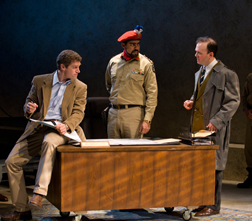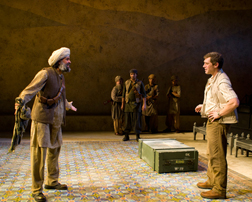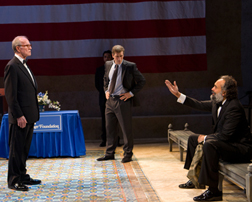By Lucy Komisar
In the mid-1980s I went to Peshawar on Pakistan’s border with Afghanistan to write about the war between the Russians and Afghans going on across the divide. It all came rushing back during J.T. Rogers’ gripping theatrical docudrama of what went wrong then (and it was virtually all wrong) with American policy in Afghanistan.
Peshawar was a sleepy little town that had a bazaar where you could buy chadors (which salesmen obligingly modeled) and Russian detritus of war such as spent shells and fur hats, relax at the U.S. mission-run bar (in a dry country), and meet the representative of Gulbuddin Hekmatyar, which I did. He was the radical Islamist which the Pakistani Intelligence Service (ISI) and thus the Americans had chosen as the major recipient of U.S. military aid. The mind boggles at how the Americans could have been so stupid.

Rogers’ play, smartly directed by Bartlett Sher, tells you how that happened. We meet an English M16 officer Simon Craig (Jefferson Mays) who is both cynical and alarmed at the U.S. predilection for the worst guy on the block. He tries to persuade the new CIA station chief James Warnock (Jeremy Davidson), who has arrived with 100,000 rifles, that he needs to support some of the less radical fighters, such as Ahmed Masood.
But the arrogant, aggressive ISI Colonel Afridi (Gabriel Ruiz) wants it to go to Hekmatyar. He declares, My army’s intelligence will be the basis of our strategy, and the equally arrogant American agrees.
The CIA chief wants information about where the ISI is sending arms and aid. That is the only oddity of the play. Why is this still a mystery? It was obvious in the mid-80s when I was there. Nor is the nature of the beneficiary disputed. Simon reminds him that Hekmatyar is known for throwing acid at women for not covering their faces.
In addition to the Brit, the other sensible fellow, by dint of harsh experience, is the Russian, Dimitri (Michael Aronov) who is funny, often drunk, garrulous and boisterous. He wants to work with the Americans to prevent rivers of blood, but that is not on the agenda. He does work out that the Russians and Americans will not kill each other’s top officials and officers.

The set is wood benches on three sides of a blue tiled floor with projections on the backdrop that show bleak beige mountains. Some of the dialogue is in the local language, a bit in Russian.
There is sitar music, but also, sureally, a tape recorder playing songs by Tina Turner and Rod Stewart, who are favored by the young fighter Saeed (Pej Vahdat). He is one of the troops of Abdulla Khan (Bernard White), a Pashtoon fighter who is presented to us as one of the good guys. And who will be used by the Americans as the good face of the Jihadists.
For a change of mood, Sher choreographs an episode of buskashi, which I saw in Peshawar. Horse riders race around a field, trying to grab a goat carcass from one another. The onlookers stand around the edge of the field and scatter when horses suddenly turn toward them at a gallop. No horses on this Lincoln Center stage.

The second act shifts to Washington, where Abdullah Khan is persuaded to lie to a Senate committee so he can get stingers to bring down Soviet helicopters. A Southern Senator ironically named Jefferson Birch (democracy soiled by the far right?) supports sending more arms and makes a God and Freedom speech to a dinner of the conservative Heritage Foundation.
Back in the war zone, Dimitri warns the American CIA man about Jihad by the Islamists. His British counterpart is furious at the Islamization by the ISI. Craig says, The ISI using Hekmatyar to tear Afghanistan apart. I don’t know if the real British intelligence chief was saying that to the real CIA guy, but it sure is what was happening.
There is a fine cast. Mays is excellent as the dour, occasionally indignant Brit. Davidson as the CIA chief comes across as a laconic sports figure. White brings the right passion and desperation to his portrayal of the Pashtoon fighter. Ruiz is properly overbearing as the ISI colonel.
Of course you can’t praise the author for being prescient; he is writing about history. But he does it with such clear understanding and fascinating and powerful detail that it’s as fine a lesson as will never be taken by American leaders.
Blood and Gifts. Written by J.T. Rogers; directed by Bartlett Sher. Lincoln Center Theater at Mitzi Newhouse playhouse; 150 West 65th Street, New York City. 212-239-6200;. Opened Nov. 21, 2011; closes Jan. 8, 2012. Review on NY Theatre Wire site.

